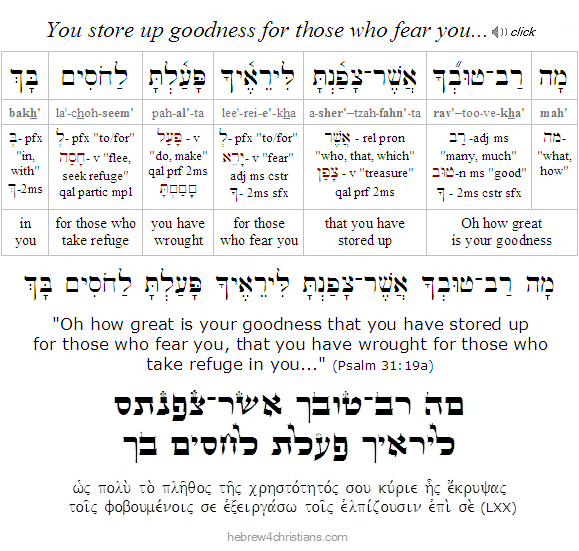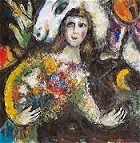|
In the parable of the "rich fool" (Luke 12:15-21), Yeshua tells the story of a certain rich man who acquired such worldly prosperity that he decided to store it all up so that he could retire in luxury and comfort. However, after he made his preparations God said to him: "You fool! This very night your soul will be collected from you. The things you have prepared, whose will they be?' Yeshua then warned: "This is how it will be for anyone who stores up treasure for himself but is not rich toward God."
We have to be on guard not to insulate ourselves with foolish faith that says we can provide for ourselves or create a hedge against future trouble. This is why Yeshua told his disciples to let go of their possessions, to give away their wealth, for then they would be rich toward God. "For where your treasure is, there will be your heart also" (Luke 12:34).
To live otherwise is to be a fool, that is, someone who misses the point of life. In this passage, the Greek word for "fool" is ß╝äŽåŽüŽē╬Į, which refers to an unthinking or thoughtless person -- someone who does not reflect on the purpose and end of life. In Hebrew the word for such a fool is "kesil" (ūøų╝ų░ūĪų┤ūÖū£), from a root that means to be obtuse and indifferent to matters of spirituality (Prov. 1:22; 17:16). The fool despises words of wisdom (Prov. 23:9) and has no real objective in life other than that which is found in the immediacy of the moment (Prov. 17:24; 21:20, etc.).
Note that a fool is not a person of low or deficient intelligence but rather someone who is decidedly indifferent to spiritual reality. The fool says in his heart that God doesn't matter and that the goal of life is to gain carnal pleasures. He is egocentric, hedonistic, and blind to the real significance of life. He focuses on this passing world and its vanities and not on the world to come. ūóųĄūÖūĀųĄūÖ ūøų░ūĪų┤ūÖū£ ūæų╝ų┤ū¦ų░ū”ųĄūöųŠūÉųĖū©ųČūź - "The eyes of a fool are in the ends of the earth" (Prov. 17:24). He is someone who "stores up treasure for himself but is not rich toward God."
On the other hand, as the late Jim Elliot said, "He is no fool who gives what he cannot keep to gain what he cannot lose." That's gathering treasure toward God. The Hebrew word for love, "ahavah" (ūÉųĘūöų▓ūæųĖūö), means to give (ūöūæ) in sacrificial kindness or compassion. And indeed this is the heart of God revealed in the sacrificial life of Yeshua. When we reciprocate by giving of ourselves to God, we are made rich in the blessing of his love.
Clinging to worldly "riches" is dangerous because it creates a false sense of security that robs us of a close relationship with the Lord. Being rich toward this world makes you a fool before God. As Yeshua taught us, "Whoever desires to save his life will lose it, but whoever loses his life for my sake will find it. For what profit is it to a man if he gains the whole world, and loses his own soul? Or what will a man give in exchange for his soul?" (Matt. 16:25-26). "What is highly esteemed among men is an abomination in the sight of God" (Luke 16:15). "Until you have given up yourself to Him, you will not have a real self" (C. S. Lewis). Indeed worldly power and prosperity are no indicators of spiritual success...
Unlike the rich fool who sought his security by storing his "treasures" into larger barns, Yeshua told us not to be anxious and to trust in God alone for our security. He pointed to the birds of the air that "neither sow nor reap nor gather into barns." God provides and cares for them; won't he also therefore take care of you? (Luke 12:24). And he continued by asking "which of you by being anxious can add a single hour to his span of life?" The Greek word for "anxious" in this verse is ╬╝╬ĄŽü╬╣╬╝╬ĮßĮ▒Žē, from ╬╝╬ĄŽüßĮĘ╬ČŽē, meaning to be inwardly divided or "double-minded." We are not to be "cross-eyed" in the way we look at things. Keep your mind set on the Lord and his care (Psalm 16:8). As Yeshua said to Peter after he sank in the waters, "O you of little faith, why did you doubt?" (i.e., ╬┤╬╣ŽāŽäßĮ▒╬ČŽē, lit., "think twice").
When we worry about things beyond our control we are acting like the rich fool who falsely assumed that he was in control of his life and that his security was to be found in his own resources... We build our lives upon the sand rather than the rock of God's truth; we focus on this world more than in the presence and promises of God.
Being "rich toward God" means partaking in the heavenly treasures of eternal life now, and investing the worldly treasures of temporal life for our everlasting blessing and the glory of God. It is a reversal of the "wisdom of the rich fool" because it values what God values over ourselves.... "Seek first the kingdom of God and his righteousness" (Matt. 6:3). True life is not to be found in the comforts and vanities of this world, but in earnest relationship with the Living God who is the Source and End of all enduring meaning, life, and happiness. Our treasure, our "riches toward God," is Yeshua, and that is where we will find our hearts.
Hebrew Lesson
Psalm 31:19 reading (click for audio):
 |
<< Return
|


